Every generation needs gets its own Twilight Zone reboot. Thanks to CBS All Access, executive producers Simon Kinberg and Marco Ramirez, and executive producer/host Jordan Peele, we finally have ours. After four episodes, however, it's hard to tell if this is a "yay" with an exclamation mark or "yay" with a question mark situation. I'm leaning toward the latter because the flaws have been impossible to ignore. Chiefly, all of the episodes are too long, not all of the twist endings truly land, and the social commentary has been a tad muddled.
Yet, this new Twilight Zone, even here in its infancy, contains moments of sustained brilliance, such as the pervasive dread which creeps over the first half of "A Stranger." Steven Yeun - playing a 2019 spin on that old Twilight Zone stock character, the mysterious visitor - unnerves us with every glance as he methodically uses "fake news" to tear apart a small Alaskan town with alarming ease. In "The Comedian," Kumail Nanjiani makes a Faustian bargain with a charismatic devil played to surprisingly restrained perfection by Tracy Morgan. "Nightmare at 30,000 Feet" sees Adam Scott reacting with relatable horror and alarm when the mysterious true crime podcast he's listening to on a plane begins to describe his own apparent death/disappearance.
Of the first four episodes, however, "Replay" comes closest to feeling like something Rod Serling would be proud to call his own. As Marc Scott Zicree argues in the new third edition of his reference book The Twilight Zone Companion, "Today's world is a place where the impossible corners of the Twilight Zone no longer seem quite so impossible. Rod would have a lot to say about the Trump era, were he still here. Beyond a doubt, he'd find fertile ground today to play any number of fresh Twilight Zone stories."
Except Serling, for all of his wonderfully humanistic leanings, wouldn't have been able to write something quite as informed by experience as "Replay." Written and directed by two black men (Selwyn Seyfu Hinds and Gerard McMurray), the episode applies the Groundhog Day time loop trope to a case of police brutality. Through the use of her oddly magical video camera, a mother (Sanaa Lathan) is forced to relive her son's (Damson Idris) death over and over again.
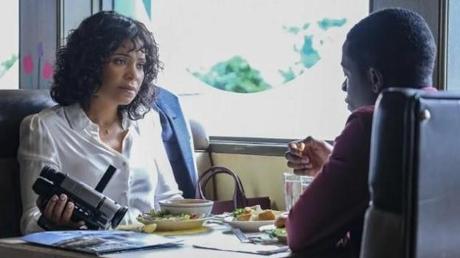
All she wants to do is complete their trip to visit his new college, but once they get on the radar of a racist cop there's almost nothing they can do to escape his obsessive pursuit. She alters their route in multiple ways, she briefly tries to approach the cop pre-hunt and connect with him as one human to another - doesn't matter. In the end, he always pursues them and it always ends in violence.
As a woman who fled from her economically challenged upbringing to become a successful lawyer as well as a mother, this is a fate Lathan's character thought she had moved past. However, "Replay" effectively argues it can happen to anyone of color. SPOILER The only strength they truly have, "Replay" concludes, is mobilizing around one another. It is only once Sathan and her son finally reach his all-black college and enter a crowd of African-Americans ready and willing to pull out their cell phone cameras to document injustice that the cop can be truly defeated.
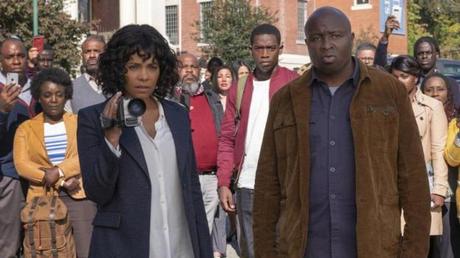
Except that's no real victory. Nor is it a happy ending. In the episode's haunting final twist, we realize a black mother will forever worry about the possibility of her son being killed by cops. The video camera at least gave this specific mother a tool to undo such an injustice. Without it, she has to rely on her faith in others and hope that we live in something remotely resembling a just society. It's not nearly enough to wipe the look of worry off of Sathan's face as she watches her son walk out the door to do something as innocent as picking up some ice cream for them to share.
Beyond being the episode closest to satisfying the spirit of Serling's original series, "Replay" is also the best at truly bringing The Twilight Zone into 2019. It successfully applies the Serling formula - sci-fi metaphors for pressing social issues - to police violence, but it also makes a dramatic point of slightly departing from the classic Serling script. The twist ending - arguably the thing most closely associated with Twilight Zone - is hardly a twist at all in "Replay." Instead, it is a sad commentary on how much our modern world seems to resemble the Twilight Zone, except no amount of moralizing and pithy summarizing by a narrator at the end can help us escape from it.
In that way, "Replay" both honors and defies Twilight Zone tradition. The other three are simply different variations on the old formula. Their newness is tied to their references to modern technology, diverse casting - such as Nanjiani and Morgan in "Comedian" and Yeun in "A Stranger" - and bloated run times. Otherwise, they aspire to be buzzy, sometimes purely pulpy Twilight Zone episodes. "Replay," on the other hand, has higher ambitions. It wants to not only bring the show into 2019 but also do something new with it.
In a world in which we already have Black Mirror on Netflix and Electric Dreams on Amazon, it's fair to ask why we need a new Twilight Zone. "Replay" is the best answer to that question. It's where anyone should start with this new show. As for which of the other episodes are worth your time, perhaps the following ranking will help:
1. "Replay"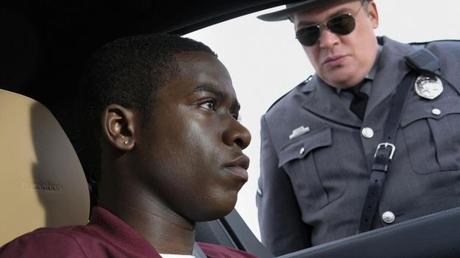
The set-up: Groundhog Day loop meets police brutality.
The commentary: Strength in numbers and community might be our best weapon against hate, but the fear we have of racial injustice is a lifelong condition.
The downside: It's hardly a subtle episode, but, then again, the same is true of many of Serling's most remembered Twilight Zone stories.
2. "A Traveler"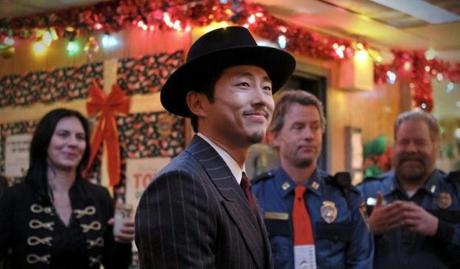
The set-up: A mysterious stranger shows up in a small Alaskan town right on the Russian border. Initially charming, he proves to be an enigmatic figure capable of pitting citizen against citizen with just a couple of well-chosen words. Suddenly, who cares about a possible Russian invasion when you no longer trust your neighbor, longtime boss, or even your own family?
The commentary: How quickly we fall apart in the age of fake news.
The downside: A Girl Walks Alone at Night director Ana Lily Amirpour, working from a script by X-Files ' Glen Morgan, beautifully weaponizes tension and dread for the majority of the runtime, turning this into a quasi-horror movie. However, after all of that dread and buildup, the ending just happens abruptly.
3. "Nightmare at 30,000 Feet"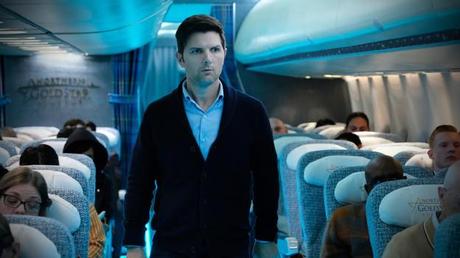
The set-up: An investigative reporter with a shaky mental health history attempts to save everyone on a plane when a mysterious podcast seems to be giving him a glimpse of the tragic future. Has he never heard of a causality paradox?
The commentary and downside: I don't know that this episode truly has some grand social commentary. Peele's closing narration makes reference to an investigative reporter failing to investigate himself...which, fine. This is Sarah Koenig's worst nightmare, I guess. However, the episode mostly works as a tight little thriller which just so happens to share a similar title to one of the most recognize Twilight Zone stories of all-time - "Nightmare at 20,000 Feet."
4. "The Comedian"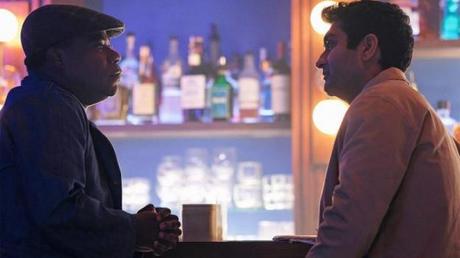
The set-up: A struggling comedian finally breaks through by abandoning his news-of-the-day jokes and incorporating his own personal life into his routine, but it comes with a price: everyone he includes in his act ends up vanishing.
The commentary: The price of fame.
Why I Ranked It Last: At 55 minutes, it's just impossibly too long. The same story and message could have been told in a little over half that time.
Twilight Zone is available to stream on CBS All Access.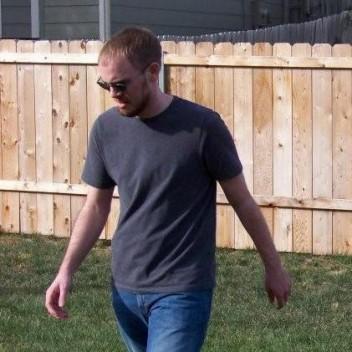
Grew up obsessing over movies and TV shows. Worked in a video store. Minored in film at college because my college didn't offer a film major. Worked in academia for a while. Have been freelance writing and running this blog since 2013. View all posts by Kelly Konda

